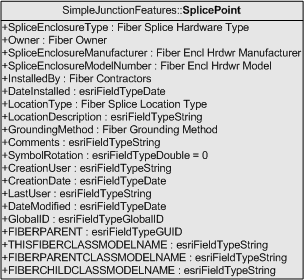

| Appendix > Fiber Manager Data Model > SplicePoint |
Version: 10.1 |
Because SplicePoints are modeled as features, they cannot be placed as a related object to a PatchLocation, DeviceLocation or a SplitterLocation. If they are needed at one of these locations, then they will need to be placed as a separate feature and connected to the PatchLocation with a short segment of FiberOpticCable. If this is a common occurrence, then an ArcFM Composite Favorite can be built to represent this configuration. This data model constraint ensures the data integrity of the geometric network that represents the fiber optic system. All cables that come together at a SplicePoint must be joined with a single SplicePoint, which is a network junction feature.
A SplicePoint is a place where two or more fiber optic cables are connected. These locations are typically a splice enclosure, but they could also be a splicing cabinet in a building. SplicePoints do not contain patch panels or devices, but they do have splicing trays. If a SplicePoint is needed at a PatchLocation, DeviceLocation or a SplitterLocation, then it will need to be modeled as distinct network features.
|
Attributes (required fields in red): SpliceEnclosureType: text - This stores the description of the enclosure surrounding the splice trays. This is not a required field and should be removed if not needed. The Fiber Splice hardware Type domain is assigned to this field. SpliceEnclosureManufacturer: text - This stores the manufacturer of the splice enclosure. This field is not required and should be removed if not needed by the organization. The Fiber Encl Hrdwr Manufacturer domain is assigned to this field. SpliceEnclosureModelNumber: text - This stores the manufacturer designated model number for the type of the splice enclosure. This field is not required and should be removed if not needed by the organization. The Fiber Encl Hrdwr Model domain is assigned to this field. InstalledBy: text - This is the contractor that installed the SplicePoint. The Fiber Contractors domain should contain all organizations that are responsible for fiber construction. As this list of contractors changes, this domain should be updated. If the domain is out of date, the other value can be used and the contractor's name can be entered in the comments field. The Fiber Contractors domain is assigned to this field. DateInstalled: date - This is the date that the SplicePoint was installed. This information can usually be collected from as-built or work order documents. LocationType: text - This is a domain-driven field for describing the location of the splice. This can be as specific or broad as needed, but it should cover all possible examples of location types for an organization. The Fiber Splice Location Type domain is assigned to this field. GroundingMethod: text - This captures how a splice enclosure is grounded, if it is grounded at all. This is not a required field and should be removed if it does not provide any benefit to an organization. For instance, if a splice enclosure is always grounded and always in the same way, then this field is of little value. If an organization is not particularly concerned how splice enclosures are grounded, then this field is not needed. The Fiber Grounding Method domain is assigned to this field. GlobalID: GlobalID - This field contains a unique number (GUID) that is generated and maintained by ArcGIS. This value is used for all relationships in the ArcFM data model and is required for Fiber Manager to function properly. FiberParent: GUID - This field contains the GlobalID of the parent object to the current object. ThisFiberClassModelName: text - This field stores the class model name assigned to the feature class on which the field resides. It is used in conjunction with the FiberParentClassModelName field to determine the GlobalID that will be placed in the FiberParent field. FiberParentClassModelName: text - This field stores the class model name assigned to the feature class that is the parent of the class on which the field resides. It is used in conjunction with the ThisFiberClassModelName field to determine the GlobalID that will be placed in the FiberParent field. FiberChildClassModelName: text - This field stores the class model name of a child object to the object on which the field resides.
|
 |